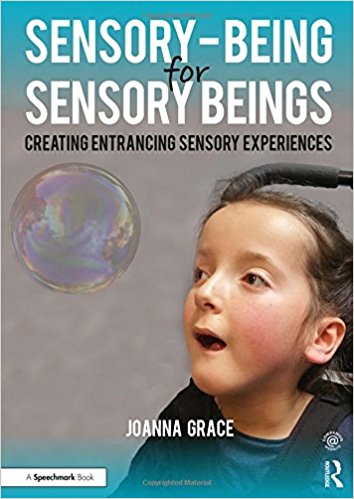Sensory-being for Sensory-Beings
Sensory-being for Sensory Beings
Jo Grace writes
This week I am that excited person. I have managed to slip the fact that my new book Sensory-being for Sensory Beings has been published into conversation with just about everyone. I even managed it at a hospital appointment. Having a book published is exciting, but for me I’m more excited that it got published, that the message in it was considered worth sharing and that now it will actually get shared.
The book is about how to facilitate the benefits of mindfulness practice for people who experience the world, and meaning within it, in a primarily sensory way i.e. for Sensory Beings. But the message within is one of equality. We are Linguistic Beings, users and understanders of language, this biases our view of the world. Sensory Beings have a different bias to their view of the world. Each view is valid, different, but equal. If we try to make everyone like us we squeeze the number of ways to view the world down to just our own view. We see less. If we try to see the world through another’s eyes we see more of this life. We ALL benefit from inclusion, not just those traditionally thought of being the recipients of its benefits.
Sensory-being for Sensory Beings is one of the outcomes of the third sensory project from The Sensory Projects. The Sensory Projects all run on the idea that you do not need expensive resources to effectively facilitate inclusion through sensory means, what you need is the right knowledge and the willingness to be a little bit creative. The need for this knowledge and creativity remains even if you have the budget for the gorgeous big fancy expensive sensory resources, because the most important thing in any sensory exchange is you: the facilitator of that experience.
And thinking about yourself is maybe something people who support Sensory Beings are often not used to doing. On my Sensory Engagement for Mental Well Being day we examine the extraordinarily high mental health care needs of Sensory Beings and we also look at the mental health of those around them. What the research shows is that those who care, whether professionally or privately as a part of a family, for someone with a special educational need or disability, are more at risk themselves of mental ill health, often suffering from stress, anxiety or depression.
Perhaps you clicked the link to this post because you thought the book might offer something relevant to the person you care for….
It will. In it you will find information about how to choose sensory experiences most likely to engage a Sensory Being, you will find information about what sorts of experiences to choose for people with different needs and to support different things. You will find out how to build those experiences into conversations that support understanding and mental well being. (You can also find out all of these things on the Sensory Lexiconary course – 2018 tour dates now live for early birds, check to see if we are coming near to you) You will be offered ideas for resources that Sensory Beings could access independently. And you will learn how to facilitate a type of mindfulness practice for the Sensory Being you support. Confusingly (and fairly unintentionally) I called this sensory mindfulness: sensory-being, the term Sensory Being came later and so I ended up with the title sensory-being for Sensory Beings.
….you will find all those things and more I hope. But I want you also to consider yourself. Mindful practice is good for you. I am not talking about sitting in a yoga studio on a mat with a teacher at the front and doing deep breathing techniques whilst an orchid grows silently in the corner. That would be lovely of course, but rarely matches the reality of our lives. I am talking about just noticing this present moment. Oxford University have an entire department set up to study mindfulness. Mindfulness is preventative of stress, anxiety and depression. And in 2009 Elizabeth Blackburn was awarded the nobel prize for her work on telomeres (the protective caps on the ends of our chromosomes). As a part of her work Elizabeth showed that mindfulness practice can actually slow down biological aging. We could say that those moments when you attend to the moment add moments to your life. And if you are someone who supports a Sensory Being then you do not need to go to a fancy yoga studio to meet someone who is an expert in doing just that. You just need to let the Sensory Being you know lead you.
By finding gorgeous sensory resources that can engage you both in an unfolding moment Sensory Beings and Linguistic Beings can share in sensory-being/mindfulness together as equals. You can do something good for you and good for them. Like I say: we all benefit from inclusion and from learning from each others differences not trying to eliminate them or hide them.
Through the running of the sensory-being project I worked alongside a team of 26 sustainable design students from Falmouth University who designed and created new sensory resources. We were supported by a team of over 25 Sensory Being Consultants who advised us on the merits of our designs and gave their opinions as to what types of sensory experience best suit sensory-being. In the writing of the book I was further supported by over forty other professionals, practitioners and parents who contribute their insights in its pages. I extend my sincere thanks to everyone.
As ever at the Sensory Projects I feel truly humbled by the support that surrounds me. The first project: The Sensory Stories project was made possible by 159 kickstarter backers to whom I remain forever grateful. I used to think of myself as a single worker with a management team 159 strong. Now it is not just 159 people who come to mind, it is all my social media friends who are so relentless in their belief in me and their understanding of me, it is the people I meet at conferences and events around the country as well as the teams who have volunteered their own time and energies to work alongside me during both the sensory-being project and the structured sensory art project. Thank you everyone, I hope that with Sensory-being for Sensory Beings I do you proud.
Joanna Grace is an international sensory engagement and inclusion specialist, founder of The Sensory Projects, trainer and author. You can find out more about The Sensory Projects on http://jo.element42.org






